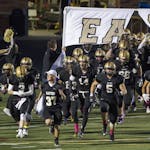Distance learning continues to be a challenge for St. Paul's high school students, including many who can ill afford to fall behind.
Students were failing more than one-third of high school classes at the midpoint of the first quarter that ends Friday, a district official told school board members this week.
About 400 students, most of them juniors and seniors, have been targeted to work extra hours to make up the credits they need to graduate, leading in turn to a new effort to steer them into a Saturday workshop providing what many have been missing: in-person help.
"Very unsettling," Board Member Zuki Ellis said of the number of students needing to get back on track.
St. Paul has continued to teach most of its students remotely this fall, but expectations are higher than in the spring when the pandemic began. Then, the district allowed every senior who was on track to graduate at midterm to receive a diploma. No such provision is in place for 2020-21. Grades must be kept up and credits secured.
Grades have fallen elsewhere across the country, too, as students struggle to maintain focus while learning online and also receive fewer hours of instruction than they would in the classroom. Two districts in the Bay Area of California reported that nearly one-third of their students were failing at least one class, the Mercury News reported this month.
St. Paul has an "Evening High School" that it created for credit-recovery purposes, and it, too, is in distance learning mode, with efforts to provide synchronous, or live, online instruction, said Darren Ginther, the district's director of college and career readiness.
He expects the number of students needing to regain credits to rise from 400 to nearly 900 at some point in 2020-21, which would be double that of a year ago, he said.
Last month, the district opened an academic support center at Washington Technology Magnet School on the North End. Students are referred there by teachers, counselors and others, including members of the faith community, for in-person academic and social-emotional supports.
That, in turn, has led to the scheduling of Saturday morning "Senior Blitz" workshops for students seeking to make up credits.
Jackie Turner, the district's chief operations officer, said the school system has learned that face-to-face contacts with teachers and others can help some kids feel more accountable for their work.
"They need to walk into a space and have somebody in front of them saying, 'OK, keep going. You can do it,' " she said. "It's not that they don't know the content. They need the motivation."
Students are given Metro Transit bus passes to get to and from the sessions, which are expected to run into January. Then, the district is hoping to expand its move into a hybrid of online and in-person instruction.
The district previously invited special-education students to return to school part time, but any expansion of the hybrid format would not come until Jan. 19, at the earliest.
While COVID-19 cases are rising, and many other districts are reverting to distance learning, St. Paul officials said they continue to prepare to bring more kids back to school, with preschoolers to second-graders next in line.
Anthony Lonetree • 612-673-4109


